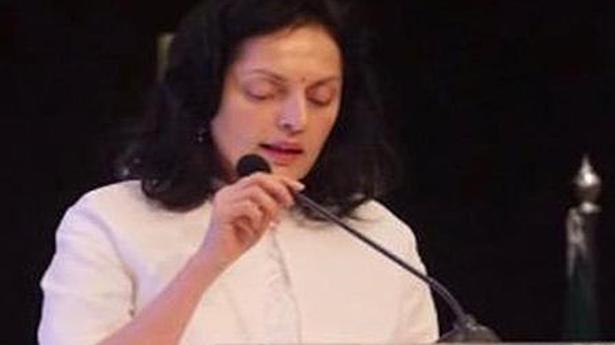
UN’s terror sanctions regime at an ‘all time low’, says India
The Hindu
In sharply critical speech at Security Council, India envoy calls for “one voice” against terrorism, slams the global body for for selectivity
The credibility of the United Nations’ sanctions regime is at an ‘all time low’, said India on Tuesday, taking aim at China, Pakistan, Afghanistan and the United Nations Secretariat over ‘selectivity’ and ‘double standards’ against terrorism.
Delivering a speech sharply critical of U.N. processes at a Security council session on ‘Threats to international peace and security caused by terrorist acts’ where she did not name the countries, India’s U.N. envoy Ruchira Kamboj took exception to China’s decision to place a hold on terror listings, the ‘glorification’ of terror acts by Pakistan, and Afghanistan’s Taliban regime for providing shelter for terror groups, including ISIL-Khorasan behind the attacks on a Gurudwara in Kabul.
In particular, Ms. Kamboj slammed the U.N. Secretary General’s (SG) report in terrorism that had, in its section on threats in Central and South Asia, referred only to ISIL-K, and not to allied groups that target India, which India has been providing information on.
“It is puzzling to us that the SG’s report chose not to take notice of the activities of the several proscribed groups in this region, especially those that have been repeatedly targeting India. Selective filtering of inputs from member states is uncalled for,” Ms. Kamboj said, adding that “the linkages between groups listed by the UNSC such as the Lashkar-e-Tayyaba (LeT) and the Jaish-e-Mohammed (JeM) pose a direct threat to the peace and stability of the region.” In a reference to Dawood Ibrahim, the Ambassador’s speech also warned that crime syndicates turning to terror received ‘state hospitality’ in a ‘neighbouring country,’ despite being listed by the UNSC.
In the submission, India expressed deep disappointment with the UNSC ‘sanctions regime’ against al-Qaeda and Islamic State (ISIL), that was first put into place in the late 1990s, and then updated as a part of the global war on terrorism. New Delhi has faced frequent blocks and ‘technical holds’ placed by Beijing in its attempts to add a number of terrorists to the UNSC designated terrorist listings, including the LeT and JeM top leadership based in Pakistan and Afghanistan.
In May 2019, China removed a series of blocks on listing on JeM chief Masood Azhar, but then thwarted a more recent joint proposal by India and the U.S. to list LeT deputy chief Abdul Rahman Makki, which is still pending a final decision. Sources said that the government is preparing more such proposals to list other wanted terrorists, and is hoping that China, which has assumed UNSC Presidency for the month of August, will not block those.
“The practice of placing holds and blocks on listing requests without giving any justification must end. It is most regrettable that genuine and evidence-based listing proposals pertaining to some of the most notorious terrorists in the world are being placed on hold. Double standards and continuing politicization have rendered the credibility of the Sanctions Regime at an all-time low,” Ms. Kamboj. “We do hope that all members of the UNSC can pronounce together in one voice, sooner rather than later, when it comes to this collective fight against international terrorism,” she added.

“Writing, in general, is a very solitary process,” says Yauvanika Chopra, Associate Director at The New India Foundation (NIF), which, earlier this year, announced the 12th edition of its NIF Book Fellowships for research and scholarship about Indian history after Independence. While authors, in general, are built for it, it can still get very lonely, says Chopra, pointing out that the fellowship’s community support is as valuable as the monetary benefits it offers. “There is a solid community of NIF fellows, trustees, language experts, jury members, all of whom are incredibly competent,” she says. “They really help make authors feel supported from manuscript to publication, so you never feel like you’re struggling through isolation.”










